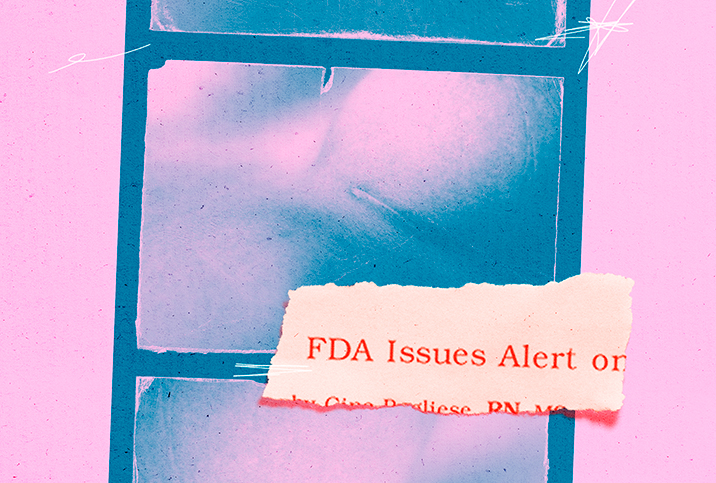FDA Issues Safety Alert for Cancer in Breast Implant Scar Tissue

The U.S. Food and Drug Administration (FDA) has issued a safety alert to patients and providers regarding reports of cancer found in the scar tissue surrounding breast implants. The types of cancers identified are squamous cell carcinoma (SCC), which is the second most common form of skin cancer, and various lymphomas, which are cancers of the immune system.
The FDA stated on Sept. 8, 2022, it believes the occurrences of these types of cancers in the breast tissue around implants may be rare.
"After preliminary review of published literature as part of our ongoing monitoring of the safety of breast implants, the FDA is aware of less than 20 cases of SCC and less than 30 cases of various lymphomas in the capsule around the breast implant," the FDA's safety alert stated.
Putting the risk in perspective
"This new safety communication may raise concern for women who have breast implants or are considering them, and rightfully so. It's important to remember, however, that despite the alarming headlines about increased risks, there are very few documented cases," stated Colleen McCarthy, M.D., a plastic and reconstructive surgeon at Memorial Sloan Kettering Cancer Center in New York City.
"According to the American Society of Plastic Surgeons, an average of 400,000 women will have breast implants placed in the United States in a typical year. It is thus estimated that millions of women in the United States alone currently have breast implants," McCarthy said.
The FDA stressed that if "you have breast implants, you do not need to change your routine medical care or follow-up," nor does it recommend implants be removed because of the safety alert.
Do breast implants cause cancer?
It's important to remember that though breast implants have been linked to various types of cancer in a small number of cases, no evidence points to implants being the cause of these cancers.
"Right now, we do not have enough information to say whether breast implants cause these cancers or if some implants pose higher risk than others," said Binita Ashar, M.D., director of the Office of Surgical and Infection Control Devices in the FDA's Center for Devices and Radiological Health, in a statement on the FDA website.
The lymphomas identified in the latest reports are different from breast implant-associated anaplastic large cell lymphoma (BIA-ALCL), which was first identified by the FDA in 2011. BIA-ALCL is not breast cancer; it is non-Hodgkin lymphoma. As with SCC and the various lymphomas, it is currently unclear whether breast implants cause BIA-ALCL.
Arm yourself with knowledge
"For women with breast implants—whether they received them for cosmetic reasons or for breast reconstruction after cancer surgery—the knowledge that implants have been associated with a risk of cancer can be troubling," McCarthy said. "By staying properly informed, however, women can feel empowered to take steps to remain safe, know when to seek medical attention and take ownership of their health.
"Women who may be considering breast implantation should aim to fully understand all of the potential risks as well as the potential benefits and, ultimately, make a decision that is right for them," McCarthy said.
The risk of cancer around breast implants is low, but women who have them should be able to recognize the signs of any potential issues, including:
- An implant that changes in size or shape
- A bump that develops in the breast
- Changes in the skin of the breast
- Lumps and/or bumps that develop in the armpit
"While these sorts of issues are likely benign, they do need to be investigated," McCarthy explained. "In addition, all women with silicone-filled breast implants should undergo occasional MRIs to identify any leaks or tears. This sort of monitoring is essential and one of the best defenses we have against any implant-associated health concerns."
If you notice any abnormalities with your breast implants, talk to your surgeon for advice on the next steps. The FDA also encourages any patients who are experiencing issues to report them through MedWatch, the FDA Safety Information and Adverse Event Reporting Program.


















